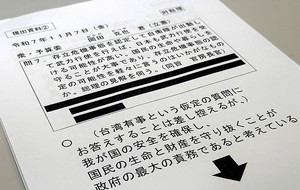April 25, 2023 at 17:45 JST
 Industry minister Yasutoshi Nishimura, second from right, addresses a news conference in Sapporo on April 16 after the Group of Seven meeting. He is joined by other G-7 ministers. (Kai Ichino)
Industry minister Yasutoshi Nishimura, second from right, addresses a news conference in Sapporo on April 16 after the Group of Seven meeting. He is joined by other G-7 ministers. (Kai Ichino)
Industrialized nations have a dire responsibility to seize the initiative on global warming, which threatens our very existence.
But Japan, which this year holds the rotating presidency of the Group of Seven powers, failed to exert vigorous leadership during debate on this pressing issue among the G-7 members. Japan should change its inward-looking stance in tackling the climate crisis.
The G-7 Ministers’ Meeting on Climate, Energy and Environment, held in Sapporo, released a joint communique on April 16.
Echoing the latest findings of the Intergovernmental Panel on Climate Change (IPCC), the statement stressed “the increased urgency to reduce global GHG (greenhouse gas) emissions by around 43 percent by 2030 and 60 percent by 2035, relative to the 2019 level.” The G-7 called for united international efforts to curtail global warming.
Referring to “the importance of significantly increasing the pace and scale of deployment of renewable energy,” the document sets collective goals for expanding solar power and offshore wind capacity.
It also mentions the G-7’s commitment to “accelerate the phase-out of unabated fossil fuels.” The scope of targets for this policy was expanded to include natural gas as well as coal. These actions represent steps forward.
However, the G-7 statement falls short on specifics. It is a weak message issued in response to the formidable challenge of achieving both decarbonization and stable energy.
Regarding many specific issues, Japan tried to roll back proposals to set more ambitious targets by the United States or Europe. Tokyo worked hard to ensure there was no agreement that was at odds with Japan’s current policy.
Japan put up especially strong resistance to proposals from its G-7 colleagues concerning power generation that relies on fossil fuels as well as automobiles. Europe called for a timeline to abandon coal, but the proposal was not adopted because Japan demurred. Numerical targets for sales of electric vehicles were not included in the communique, either, again due to Japan’s opposition.
Japan focused its efforts mainly on winning G-7 approval of its own strategy. It has argued that co-firing ammonia in thermal power generation is a promising technology to reduce carbon dioxide emissions. But this argument failed to find support among other G-7 nations. Both the United States and Europe remain skeptical about this technology, which they contend will take too long to become practical and help prolong the use of coal.
Economy, Trade and Industry Minister Yasutoshi Nishimura touted the G-7 environmental meeting for producing an agreement on “pursuing common goals through diverse paths.” But Japan cannot play a leading role in tackling key environmental challenges if it continues to focus on protecting the interests of domestic industries.
The G-7 goal of slashing global greenhouse gas emissions by 60 percent by 2035 is hard to achieve. It will become increasingly difficult to continue foot-dragging on abolishing coal-fired power generation and promoting electric vehicles without specific actions.
The G-7 leaders need to engage in-depth debate on this challenge during their scheduled meeting in Hiroshima in May. Japan’s leadership as this year’s G-7 president will be seriously tested.
Behind Japan’s failure to play a high-profile role in leading debate on climate and other environmental challenges is its delayed policy responses at home.
We urge the government to review its current environmental policies and consider additional measures with an eye to accomplishing the goal for 2035. That will allow it to accelerate the nation’s progress in reducing energy consumption and promote renewable energy.
--The Asahi Shimbun, April 25




















A peek through the music industry’s curtain at the producers who harnessed social media to help their idols go global.
A series based on diplomatic documents declassified by Japan’s Foreign Ministry
Here is a collection of first-hand accounts by “hibakusha” atomic bomb survivors.
Cooking experts, chefs and others involved in the field of food introduce their special recipes intertwined with their paths in life.
A series about Japanese-Americans and their memories of World War II